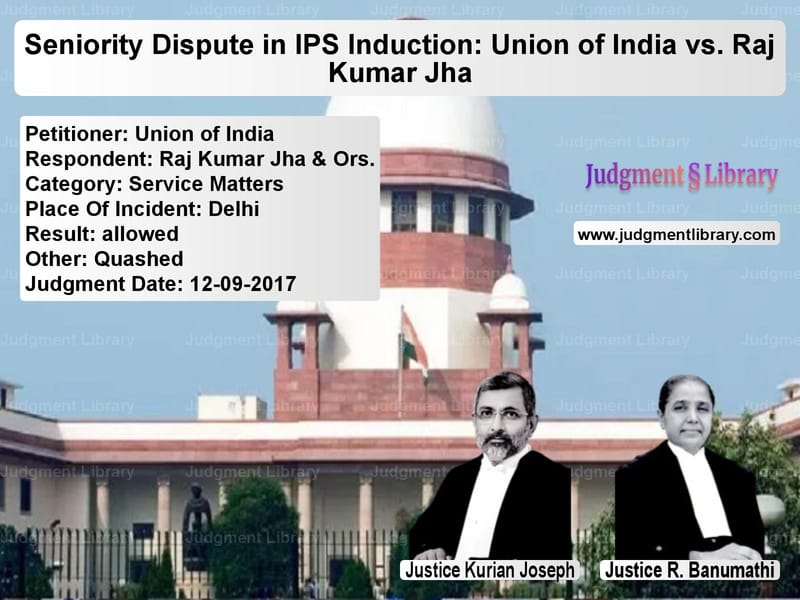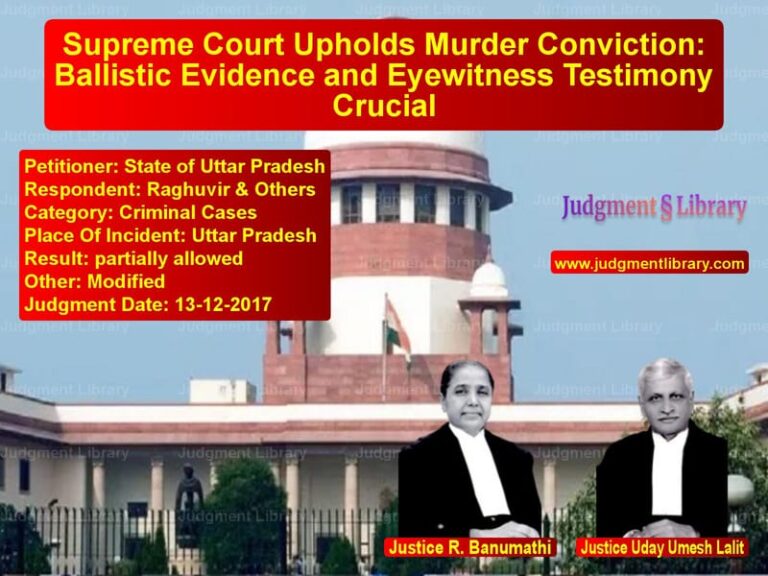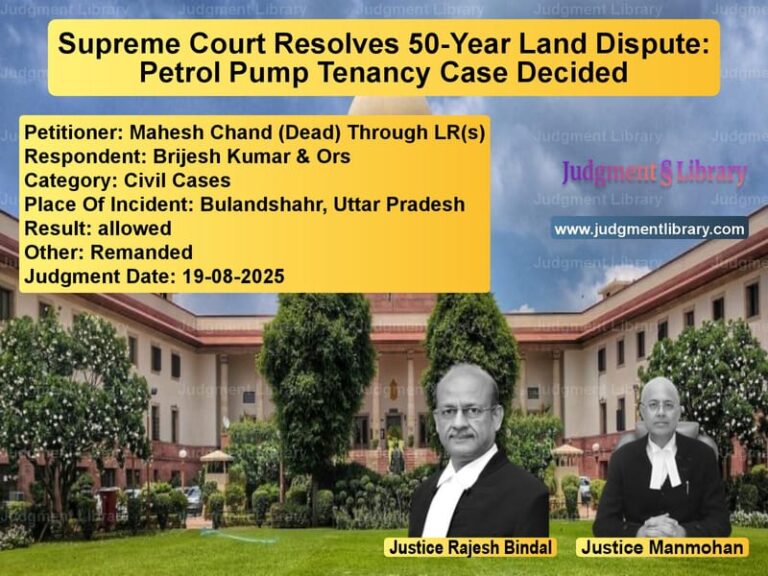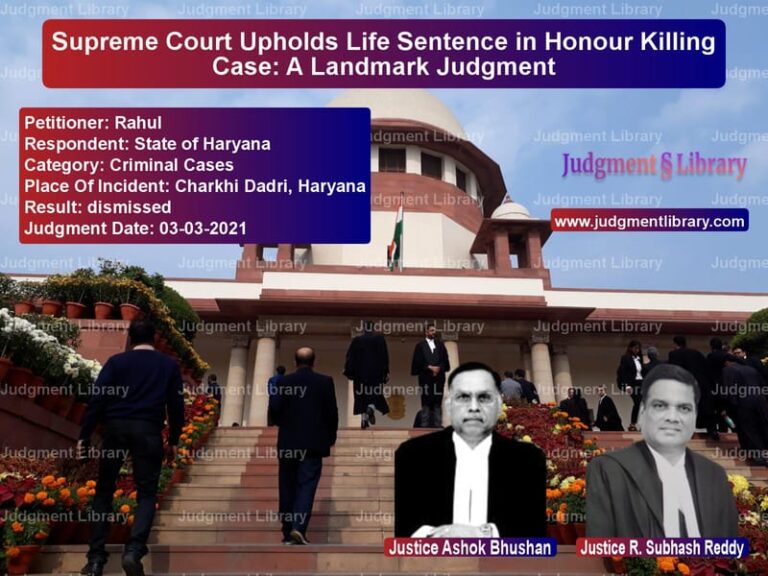Seniority Dispute in IPS Induction: Union of India vs. Raj Kumar Jha
The case of Union of India vs. Raj Kumar Jha revolves around a dispute regarding the fixation of seniority in the Indian Police Service (IPS) for officers inducted from the Delhi, Andaman and Nicobar Islands, Lakshadweep, Daman and Diu and Dadra and Nagar Haveli Police Service (DANIPS). The Supreme Court had to determine whether the seniority of an officer inducted into the IPS should be based on their grade pay or their date of induction into the IPS.
The Union of India appealed against the judgment of the Delhi High Court, which had upheld the decision of the Central Administrative Tribunal (CAT). The Tribunal had directed the government to revise the seniority of DANIPS officers inducted into the IPS based on their grade pay, following the recommendations of the Sixth Pay Commission. The Supreme Court was required to decide whether this approach was legally valid.
Background of the Case
Raj Kumar Jha and another officer, Mr. Choudhary, joined DANIPS in 1987 and were promoted to the Junior Administrative Grade-II (JAG-II) in 2007 and Junior Administrative Grade-I (JAG-I) in 2010. However, their promotions were granted only on an ad-hoc basis as the state had failed to conduct regular Departmental Promotion Committees (DPCs) for these posts.
Meanwhile, the process for inducting DANIPS officers into the IPS had begun. The officers were asked to submit their unconditional willingness for induction, but they claimed that discrepancies in the rules governing their promotion and seniority put them at a disadvantage.
The officers approached the Central Administrative Tribunal, seeking:
- Retrospective regularization of their promotions in JAG-II and JAG-I.
- Revised seniority in the IPS based on their grade pay.
The Tribunal ruled in their favor and directed the Ministry of Home Affairs to convene a DPC, complete the process for promotions, and grant them induction into the IPS. The Tribunal also agreed that seniority should be based on grade pay.
The Union of India, aggrieved by this decision, challenged the order before the Delhi High Court, which upheld the Tribunal’s ruling. The matter then reached the Supreme Court.
Legal Issues
The Supreme Court identified the following key legal issues:
- Should seniority in the IPS be determined by grade pay, as per the Sixth Pay Commission’s recommendations?
- Was the High Court justified in directing the government to amend the service rules based on pay band classifications?
- Did the Pay Commission’s recommendations have any bearing on the rules governing seniority in the IPS?
Arguments by the Appellant (Union of India)
The government, represented by the Union of India, argued:
- Seniority in the IPS must be based on the date of induction into the service, not on prior service in DANIPS.
- The High Court erred in relying on the Sixth Pay Commission report, which was intended to address pay scales and not service seniority.
- The grade pay mechanism was meant for pay protection during induction but did not affect seniority among IPS officers.
- Direct recruits to the IPS would be unfairly disadvantaged if lateral entrants from DANIPS were given seniority based on grade pay.
Arguments by the Respondent (Raj Kumar Jha & Ors.)
The respondents, represented by Raj Kumar Jha and Mr. Choudhary, contended:
- The Pay Commission report had been accepted in full by the government, and its recommendations should apply to all government employees, including those inducted into the IPS.
- Since grade pay determines the status of an officer within a service, it should also govern seniority.
- Fixing seniority solely based on the date of induction would unfairly disadvantage officers who had served in DANIPS for years before induction into the IPS.
- The government had been inconsistent in applying seniority rules, allowing some officers to benefit while denying relief to others.
Observations of the Supreme Court
The Supreme Court carefully examined the legal provisions governing IPS induction and seniority. The Court observed:
‘Seniority in the IPS is to be fixed on the basis of the length of service in the IPS. It cannot depend on the service rendered by an officer in a different service prior to induction into IPS.’
The Court further clarified:
‘The Pay Commission’s recommendations apply only to pay scales and allowances. They do not override statutory service rules that govern seniority in the IPS.’
Regarding the High Court’s directive to amend the service rules, the Court stated:
‘The judiciary cannot direct the executive to frame or amend legislation. Service rules must be interpreted in accordance with existing law and cannot be altered based on a Pay Commission report.’
Final Judgment
The Supreme Court allowed the appeal filed by the Union of India and set aside the Delhi High Court’s judgment. The Court ruled:
- Seniority in the IPS will depend on the date of induction into the service, not on grade pay.
- The Pay Commission’s recommendations do not govern seniority in the IPS.
- The direction issued by the High Court to amend service rules was beyond its jurisdiction and was quashed.
The Court concluded that fixing seniority based on grade pay would distort the hierarchy in the IPS and create inconsistencies in service progression.
Impact of the Judgment
This ruling has significant implications for civil service appointments and promotions:
- It reinforces that seniority in the IPS is determined by the date of induction, ensuring consistency across different batches.
- It prevents Pay Commission recommendations from being misinterpreted to alter service rules.
- It upholds the principle that courts cannot direct the executive to amend laws or service regulations.
- It ensures that direct recruits to the IPS are not unfairly disadvantaged by lateral entrants from other services.
Conclusion
The Supreme Court’s judgment in Union of India vs. Raj Kumar Jha establishes that seniority in the IPS must be determined based on the date of induction rather than grade pay. The ruling clarifies the scope of Pay Commission recommendations and reinforces the principle that judicial intervention in service matters must adhere to statutory rules. By setting aside the High Court’s directive to amend service rules, the Supreme Court has upheld the integrity of civil service seniority principles and ensured fair treatment for all IPS officers.
Don’t miss out on the full details! Download the complete judgment in PDF format below and gain valuable insights instantly!
Download Judgment: Union of India vs Raj Kumar Jha & Ors. Supreme Court of India Judgment Dated 12-09-2017.pdf
Direct Downlaod Judgment: Direct downlaod this Judgment
See all petitions in Promotion Cases
See all petitions in Public Sector Employees
See all petitions in Recruitment Policies
See all petitions in Judgment by Kurian Joseph
See all petitions in Judgment by R. Banumathi
See all petitions in allowed
See all petitions in Quashed
See all petitions in supreme court of India judgments September 2017
See all petitions in 2017 judgments
See all posts in Service Matters Category
See all allowed petitions in Service Matters Category
See all Dismissed petitions in Service Matters Category
See all partially allowed petitions in Service Matters Category







